15 Totally Addicting Korean TV Shows to Boost Your Language Skills
Can’t stop binge-watching your favorite TV shows? Turn your TV addiction into Korean language practice! Korean TV shows are a great way to learn the Korean language… plus they’re really hot right now!
Can you really learn by watching Korean TV serials, shows, and dramas? Yes, with the right approach. It’s not just about passive watching, though. You need to actively engage with what you’re watching.
Here’s my three-step method:
Step 1: Watch a short scene without subtitles to pick out what you can.
Step 2: Watch it again with subtitles to see how much you understood and piece together what you didn’t.
Step 3: Take notes of things you heard to later look up and practice them with your language exchange partner.
(You can find a more detailed three-step process here).
In time, you’ll start to understand more and more of the show as you watch.
Watching TV is a nice break from traditional studies. Think about it: you don’t sit around only absorbing info in your native language. You enjoy the language through music, books, and TV. You should do the same in your target language!
Finding native resources you enjoy in Korean will help you stick with it longer and grow to love and understand the language.
Now it’s time to pick your Korean TV shows to watch!
I recommend watching one Korean show from each of the three categories below. They’ll offer different styles of both language and real-life situations. Some of these you can find on Netflix, otherwise, check out Viki.
5 Korean TV Drama Shows to Fall in Love With
 Boys Over Flowers
Boys Over Flowers
An international hit, Boys Over Flowers is based on the Japanese manga Hana Yori Dango. The show follows Geum Jan-di, a poor but sassy student on scholarship at a prestigious high school. The school is dominated by the F4 – rich heirs to South Korea’s largest conglomerates. They’re bullies, but everyone is obsessed with them… except for Geum Jan-di. She butts heads with the leader of the F4, Gu Jun-pyo, who bullies her relentlessly.
Over time, love triangles form and there are tons of mishaps. The show focuses on social status, romance, and high school conversations. Plus, there’s a lot of discussion about feelings in simple language, so you’ll learn how to express your feelings with those you care about.
 My Love From the Stars
My Love From the Stars
This award-winning drama is about Do Min-joon, an alien who came to Earth during the Joseon Dynasty in 1609. Stranded here for centuries, he’s almost like a vampire from Twilight – he has crazy special abilities, never ages, and has to move and change his identity so no one knows the truth.
Fast forward to the present day. When he’s almost able to go home, he meets Cheon Song-yi. She’s a famous actress who moves in next door. Do Min-joon falls in love. He constantly becomes entangled in both her life and weird circumstances around her career.
Do Min-joon is a great example of going from formal to casual speech as you get to know someone. You’ll also pick up a lot of helpful vocab that’s consistently repeated throughout the series.
 The Heirs
The Heirs
The show’s full title is “Heirs: He Who Wears the Crown Must Bear Its Weight.” It’s about a group of rich high school students (a popular K-Drama troupe, if you can’t tell) who are heirs to huge family businesses. The series centers around forbidden love, family duty, and finding one’s own identity.
Like Boys Over Flowers, you’ll see how language is affected by social classes. And the variety of characters will also expose you to different expressions, idioms, and phrases.
 What’s Wrong With Secretary Kim
What’s Wrong With Secretary Kim
Based on the novel by Jung Kyung Yoon, the show is about company vice president Lee Young-joon and his secretary, Kim Mi-so. Lee Young-Joon is an extreme narcissist and doesn’t treat his loyal secretary Kim Mi-so very well. After nine long years of feeding his ego, she decides to quit. Of course, misunderstandings and a love triangle pop up as a result.
You’ll hear a lot of different speech patterns, boss-to-subordinate language, and vise-versa. And you’ll pick up different business titles and vocab, which you’ll need to know if you want to work in a Korean company. Besides, they will appear in almost every show you watch.
 Descendants of the Sun
Descendants of the Sun
In this action, war, and romance drama, Yoo Si-jin is a captain of a special forces unit who falls in love with Dr. Kang Mo-yeon. They begin to date, but eventually realize their life goals don’t align. Their relationship has many ups and downs through the nature of their jobs and being stationed in different locations overseas.
The show is incredibly popular and has more action than a lot of K-Dramas. Because it’s set during war times, you’ll hear army lingo and helpful medical terms.
5 Addicting Korean Reality TV Shows
 I Can See Your Voice
I Can See Your Voice
This reality game show is the opposite of “The Voice” in America. On “The Voice,” the judges can’t see the singers during the blind auditions and judge only their voice – not their looks. On “I Can See Your Voice,” the judges try to guess which contestants are skilled and which are tone-deaf by their appearance only.
The judges are guest artists, and they have a panel to offer advice and help them decide. After the judges decide to eliminate a contestant as a “tone-deaf singer,” the contestant returns to the stage to sing and reveal the truth. If the contestant is the last one standing, they either get to record a single with the guest artist or earn prize money (depending on if they can really sing). You’ll learn a lot of music-related vocab with this show.
I Live Alone (Home Alone)
A mix of reality and variety show, “I Live Alone” follows celebrities around in their everyday life, both at home and out and about. The celebrity of the week shows the viewers their home and their routines and a panel of hosts comment on it.
There’s a wide variety of celebrities on the show: models, singers, actors, athletes, comedians, and more. But everyone is single and lives alone. This is a great show to learn vocabulary relating to many different occupations, as well as phrases and words used throughout everyday routines.
We Got Married
“We Got Married” pairs up celebrities for fake marriages. The show follows them through their adventure to complete assigned tasks and make their fake marriages work. The show is insanely popular, boosting the popularity of participating celebrities as a result.
You’ll learn a lot about relationships in South Korea, celebrities, and pop culture. Plus, you’ll pick up vocabulary and phrases for talking about marriage, relationships, and every day “married” life.
Hyori’s Bed & Breakfast (Hyori’s Homestay)
Hugely successful on Netflix, “Hyori’s Bed & Breakfast” (also called “Hyori’s Homestay”) features K-Pop icon Lee Hyori and her rockstar husband Sang-soon. They opened up their home as a B&B for travelers on the Jeju Islands. The show is simple and pleasant to watch as travelers come to stay, chat, and share meals together.
The show is both calming and great for picking up many different styles of speech, slang, idioms, and casual phrases. If you like the chill vibe of Netflix’s Japanese sensation “Terrace House,” you’ll love this show featuring South Korea’s sweetheart.
 Chef and My Fridge
Chef and My Fridge
Also called “Please Take Care of My Refrigerator,” in each episode the best chefs in Korea compete to create fantastic dishes on the spot from ingredients inside the guest star’s own fridge. The chefs have only 15 minutes to complete the task. The guest star chooses who is the winner with the most delicious impromptu dish.
If you like cooking shows in your native language, you’ll love this one. And you’ll get a solid grasp on the vocab for food, how to talk about cooking, and describing taste.
5 Variety Korean TV Shows
 Running Man
Running Man
This is the epitome of a kooky variety show! In every episode, the show’s stars must compete with each other to win a race or games. The missions are often outrageous and create silly antics among the contestants. It’s one of the longest-running variety shows in South Korea.
This is a fun show to watch, and you’ll always learn something new since every show changes the missions.
Weekly Idol
Variety shows are all about having celebrities do a lot of random things, which makes them fantastic for learning Korean. This show has celebrity MCs who host guest celebrities on each episode and challenge them to perform silly segments.
If you enjoy watching Jimmy Fallon play crazy games, lip sync, and dance with his guests on “The Tonight Show,” then you’ll like Weekly Idol.
2 Days & 1 Night
If you want to get an idea of places to visit in South Korea, watch this show. “2 Days & 1 Night”’s slogan is “real wild road variety show,” and it sends the cast members all over the country to new destinations. They have to complete missions and games to earn rewards while traveling. If they fail, they’re punished.
This is a great show to gain knowledge, vocab, and phrases of locations and travel in South Korea!
 Knowing Bros
Knowing Bros
Also called “Men on a Mission” or “Ask Us Anything,” cast members and guest celebrities act in segments as high school classmates. Most of the show has the cast playing games or performing impromptu scripts.
This show is fantastic for learning casual, informal speech. Unlike other variety shows where there’s still a strict rule of formal/informal language based on social hierarchy and seniority, “Knowing Bros” encourages all the guests to speak easily with each other. Besides that, all the skits take place in a classroom setting, so you’ll learn a lot of idioms, phrases, slang, and vocab related to school and high-school-age lingo.
Infinite Challenge
“Infinite Challenge” is an unscripted, challenge-based variety show, and considered the first of its kind. The challenges are often extreme, ridiculous, and comical. Unlike many other variety shows, it focuses on satire for comedy.
There’s so much to pick up in each episode, with phrases and words repeated often throughout each episode as a challenge’s focus.
Binge-Watch and Learn!
Watching good Korean dramas, variety shows, and reality shows can actually expose you to a wide range of the culture and language. If you dabble in a bit of it all, you’ll start to develop a well-rounded base for your language and understanding. After all, pop culture and TV shows heavily influence language and what’s being discussed on a day-to-day basis.
Korean is easier to learn than you think, and this is just one of the ways you can boost your language skills. If you want to see other resources and methods, check out our list of 35 of the greatest Korean online resources.


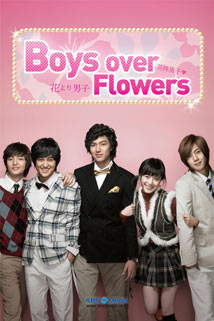 Boys Over Flowers
Boys Over Flowers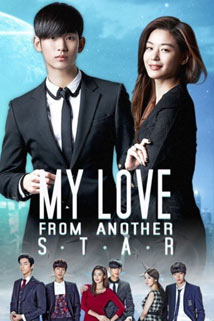 My Love From the Stars
My Love From the Stars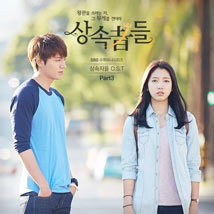 The Heirs
The Heirs What’s Wrong With Secretary Kim
What’s Wrong With Secretary Kim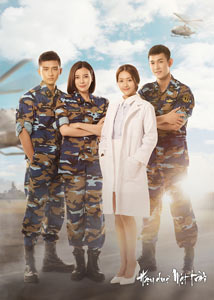 Descendants of the Sun
Descendants of the Sun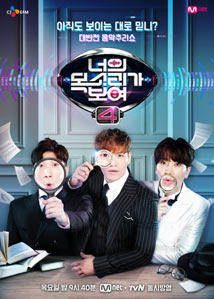 I Can See Your Voice
I Can See Your Voice Chef and My Fridge
Chef and My Fridge Running Man
Running Man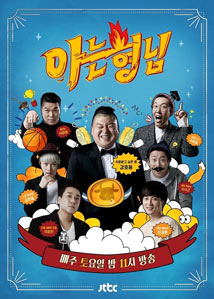 Knowing Bros
Knowing Bros
Social